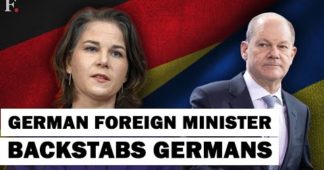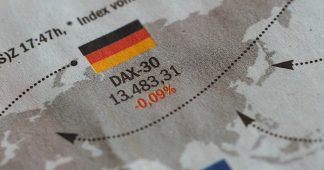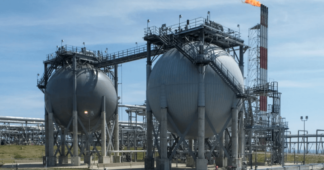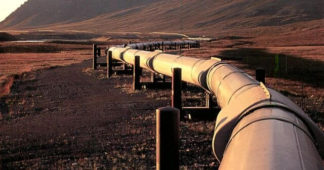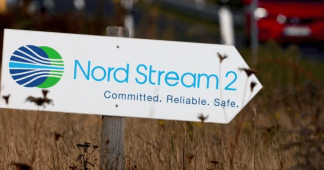by Harri Gruenberg (*)
Germany is in a deep crisis. The economic crisis that has been shaking Germany for some time is reaching a new level. Germany is the only G7 country not achieving any growth. For the first time in history after 1949, Germany experienced a slump in the economic growth curve that had previously been constantly rising. But unlike previous crises, the current crisis cannot be easily resolved. It is a structural crisis for Germany that goes hand in hand with geopolitical changes. Germany benefited from cheap Russian energy, which has supplied the country with cheap gas since the 1980s and helped Germany to be competitive on the world market despite high wages and a welfare state that was already damaged but still exists in international comparison despite the neoliberal offensive.
In the war against Russia provoked by NATO, Germany subordinated itself as a vassal to the USA. By blowing up the North Stream gas pipeline by the USA and its closest ally Poland and the Baltic states and Great Britain, the German government accepted the blow to the lifeline that secured the industrial supremacy of German capitalism. Because Washington’s aggressive policy against Russia and China, its fight against its own decline, also aims to weaken its German competitor, to slow down the development of Germany’s imperialist middle power and to subordinate German imperialism’s own hegemonic plans to the USA again.
Germany’s war course against Russia is now emptying social coffers while military spending is growing. In the long run, no welfare state can be maintained during war and this is proven by the fact that the new budget for 2024 has enormous social cuts and this is just the beginning.
The social and economic crisis is exacerbated by an eco-capitalist restructuring that is particularly directed against the majority of wage earners and popular classes. This ecological restructuring is developing as an impoverishment program.
While the energy costs of industry are to be subsidized, the costs for ordinary people are increasing extremely. The high energy costs have made everything extremely expensive through inflation and are leading to a loss of real wages, which could not be prevented despite militant strikes in the public sector. Militant strikes took place, but because of the capitulation of the trade union bureaucracy that defended the government of the Social Democrat Scholz, collective agreements were agreed that led to a loss of real wages.
But that’s just the beginning – Scholz’s liberal coalition partners are calling for further cuts. Because the eco-capitalist restructuring and maintaining the competitiveness of the German economy are only possible if wages tend to fall, so that the financing of the welfare state and whether energy will become cheaper through the promotion of alternative energies is still completely open. German capitalism will be dependent on oil and gas for a long time, but now they are much more expensive to obtain. Germany has to purchase more expensive fracking gas from the USA or liquefied gas from Russia via the Indian market.
All of this causes the media flagship of German capitalism, the Frankfurter Allgemeine Zeitung, to speak of the sick man in Europe because there is a dramatic contraction in German industrial production. Important companies, especially in the chemical industry, are moving abroad from places where energy prices are cheaper, primarily to the USA.
On the political level, the economic and social crisis of German capitalism is reflected in a crisis of power. 70 percent of the population has no trust in the current government. This is a historic event for Germany. All government measures by the coalition of SPD, Greens and Liberals are met with mistrust and rejection, they exacerbate the conflicts in the government, they paralyze them and, above all, they produce outrage and resistance among the population.
We are dealing with a real rebellion by growing parts of the population, which is particularly expressed in high poll numbers for the right-wing party AFD in the absence of a left-wing alternative. All surveys indicate that the Alternative for Germany party is benefiting from the crisis, it is at 22 percent in the East and even over 30 percent, but that only in protest and if there is a popular left-wing alternative under Sahra Wagenknecht, then it could be similar to Melanchon in France expect up to 15 percent of the votes. Many of those who support or vote for the AFD are former voters of the Die Linke party who no longer votes for the Die Linke party out of disappointment and protest. In 2007, the Left party received 14 percent and 4.9 percent in the 2021 federal election.
In the eyes of the popular classes, the Left has become a party that no longer has anything to do with the reality of their lives. In stead of focusing on the social question, it loses itself in a jungle of identity-political demands for minorities. It is increasingly copying the Greens, who are hated by the popular classes. The Greens’ ecological transformation is perceived as an elite project that the modern, cosmopolitan urban middle classes can afford. The Left party is also primarily elected by the modern, cosmopolitan urban middle classes and competes with the Greens for the same voter clientele. Only 3 percent of the working class vote for Die Linke. In 2007 15 porcent of the working class voted for Die Linke
And in the NATO proxy war against Russia, the Left Party positioned itself as an anti-Russian, pro-Ukrainian party that adopted the NATO war narrative. In line with the federal government and NATO, Die Linke is also demanding that the precondition for a ceasefire is the withdrawal of Russian troops from Ukraine. Parts of this party are calling for arms deliveries to Ukraine.
This development of Die Linke began years ago and was criticized by the working class-oriented left wing of the party, embodied by Sahra Wagenknecht and Oskar Lafontaine. With the influx of more and more young left-liberals into the party, who have now become the majority of the party, a culturally integrated structural majority has formed so that there is no longer a point of return. Today’s membership of the Left is interchangeable with that of the Greens and the young members of the SPD. They see themselves as part of a progressive transatlantic camp in contrast to the left-wing conservative camp represented by Melanchon and Sahra Wagenknecht.
The upheaval situation in which we live, the structural crisis of German imperialism and global imperialism as a whole, the economic and social decline of Germany, as well as the failure of the Left Party in this historical situation, all of this favors the construction of a new popular left. It will most likely begin as a new formation with a split in the Die Linke faction in the Bundestag and continue with the founding of a democratic, anti-militarist electoral alternative to the European elections and with the founding of a new party at the beginning of 2024.
The electoral alternative to the European elections should appeal to civil humanist forces that are against the war together with traditionally socialists. Their goal is to put pressure to end the war as well as an end to the sanctions and the repair of Nord Stream and its return to service. The EU Europe as it is now with the Maastricht and Lisbon agreements is a neoliberal and militaristic Europe. The EU must be rebuilt on the basis of new treaties and, as a democratized project, must be a Europe of the peoples.
Ecological policy must, above all, be socially oriented so that it is also accepted by the popular classes. The ecological conversion must be long-term and involve phased transitions. It must not destroy either the social or industrial base, which must become ecologically cleaner in the long term.
Together with Corbyn’s initiative to form a new party in Great Britain, the new left-wing party in Germany will above all have to solve the crisis facing left-wing politics in Europe, the lack of a mass base of the left in the working class. Large parts of the left have turned away from the working class and left space to the right. The new left in Germany must, above all, focus primarily on the working class in the broadest sense. This goes some way to solving the problem of the lack of revolutionary leadership in the general crisis of the capitalist system. Marxists who stand in the tradition of the labor movement will support this process. For this purpose, the Wastun ( Lenin’s “what is to be done) network was formed from the Die Linke party, which supports Sahra Wagenknecht and wants to intervene programmatically in the new party.
(*) Member of the Coordination Committee of Was Tun, network of Socialists supporting Sahra Wagebknecht
We remind our readers that publication of articles on our site does not mean that we agree with what is written. Our policy is to publish anything which we consider of interest, so as to assist our readers in forming their opinions. Sometimes we even publish articles with which we totally disagree, since we believe it is important for our readers to be informed on as wide a spectrum of views as possible.
